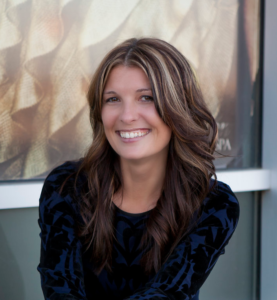Living life as a Cervivor involves tweaking one’s daily life to find a new normal that provides the best quality of life possible during and after treatment. This involves researching options available for relief from side effects, advocating for the best medical care, networking with other Cervivors, and trying a variety of remedies to feel well. It can be exhausting physically, mentally, and financially. It does not end because many side effects are lifelong conditions such as Lymphedema.
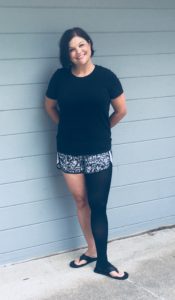
As an almost 13-year Cervivor of Adenocarcinoma 1B2, I have mastered the art of this “Cerviving” thing very well because I am used to it. It is just part of who I am. Every little ailment or pain does not typically trigger me or cause me to fear I am having a cancer recurrence. I know in some areas of my health I have some “special needs” and I embrace them. I always counted myself blessed to not have lymphedema. In 2005 I had 44 lymph nodes removed, a radical hysterectomy, and radiation. Recently, after a hospital stay for double kidney infection, I developed painful symptoms in my pelvis that were negatively affecting my daily life. Soon I would be making some serious lifelong changes to my daily life to manage the discomfort I was feeling. Cancer has created a voice in me that advocates for the care I deserve and researches the best options to treat my conditions. I was not finding relief after being discharged from the hospital with double kidney infection. While doctors were thinking my issues involved my immune system fighting off the kidney infection, my gut told me to push on to find a second opinion. A friend noted that my health was creating a sub-par quality of life for me daily and it was making me feel down. I had to make many phone calls and eventually travel to a different hospital for an amazing team approach. After several specialists and tests, it was determined that this was a lymphocyst in my pelvis and that I did indeed have lymphedema. Crud! I was already managing every other side effect, and now this? Cancer is always the gift that keeps on giving.
What is Lymphedema?
Lymphedema is the swelling in the arm or leg that occurs if the flow of tissue fluid (lymph) out of the extremity is restricted somehow. Our lymph system consists of a network of vessels, like blood vessels except these carry a clear fluid called lymph. In my case, the lymph was not properly percolating through small bean-sized lymph nodes that cluster in my pelvis area. And well, it hurts A LOT. I often describe how it feels, by comparing it to a balloon sitting on my lady parts and there is a definite area inside my thigh that hurts ALL THE TIME. When I walk I can feel the pressure and it makes me limp. My leg feels heavy and numb for hours or days at a time as if it is asleep, but it won’t wake up. Half of my lower extremities feel more swollen than the other half. The pressure pushes on my sciatic nerve and it hurts to sit and sometimes it throbs when I am not even moving. When I am having pain, an hour standing feels like three hours. I just want to put my leg up and keep it straight because sitting or bending it really isn’t much fun. The pain just sits there inside my left pelvis area and it won’t go away. I sometimes want to cut my leg off or get a spinal block, so I can’t feel it anymore. My leg sometimes feels like it is not even part of my body.
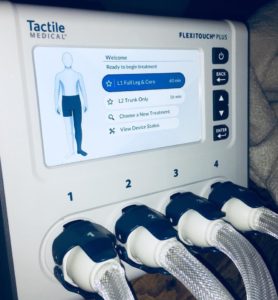
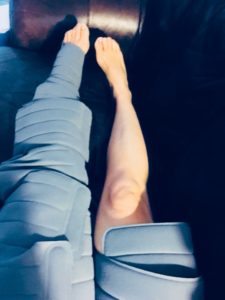
A plan had to be developed to help me manage the pain and daily living. This involves compression garments for my left leg, a special lymph node massage machine I use daily, manual lymph node massage throughout my day, special wraps I sleep in at night, dieting to put less pressure on my groin area, doing individualized daily exercises for pelvic pain, drinking plenty of water, and avoiding hot showers/baths or extreme cold. My least favorite part is putting on my compression stocking each day. Putting them on feels as difficult as childbirth some days, but they truly help. Just this week my physical therapist, Dr. Lili Wells started a special therapy called “introital stretching” because the tissue inside my vaginal area is as stiff as a board. This is supposed to really help reduce my pain in this area after as few as six sessions. I also had my medical provider help me acquire handicap parking until (or if) my symptoms improve. Some days are better than others, but I am not going to let it slow me down.
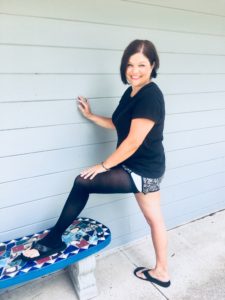
I have been very blessed to have great insurance to help offset the expenses of dealing with lymphedema. I had several CT Scans, an MRI, a Lymposcintigraphy where they shot dye up my feet (so very painful), and they did try to aspirate the area with a guided CT. This did not seem to help for very long and it may be repeated in the future, but also cauterized next time. I will try anything to make the pain stop. There are cutting edge procedures in Lymphedema that I am looking into. A very small number of U.S. institutions treat lymphedema with a comprehensive multidisciplinary lymphedema service. These places are trying to change the perception that it is an untreatable, lifelong condition. Dr. Wei Chen of the University of Iowa feels that medical professionals have an obligation to treat lymphedema because they are causing it due to surgery and radiation. I do not know if I am a candidate to be treated at one of these institutions, but it is exciting to read about “Lymphies” finding more permanent relief with new procedures. I recently made an appointment to see if this could help me in the future.
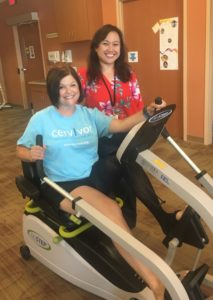
I have always tried to boldly “Walk in my Cervivorship” because to me that is the best way to overcome any adversity and advocate after my cancer experience. There is no forgetting that I had Cervical Cancer. Some days, managing all of this makes me cry because I remember what life was like before cancer and I feel it puts limitations on me that complicate my daily life. At times, I become distracted because all I am thinking about is what I need to do to get ahead of the pain or what is the next step in my daily regimen. But then the perseverance I have within my soul rises and grabs back my joy while I prance around in my rock star compression stockings ready to take on the world.
Read Shawna’s Cervivor story here.
